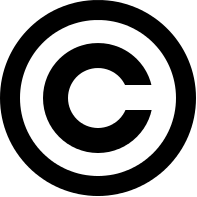As both creators and users of copyrighted works, it is good to know a little about this topic. Below, you will find a brief copyright primer. For answers to copyright questions pertaining to your thesis, see FAQs for Dissertation & Thesis Writers from the Tufts University Libraries Scholarly Communications Team, where you will find answers to questions such as: Can I delay the release of my thesis? What if I have already published part of my thesis as an article? What if I want to reuse a graph created by someone else in my thesis? What is open access?
What is copyright?
Copyright is a set of rights, which give the owner the exclusive right to do or authorize any of the following: reproduce the copyrighted work; prepare derivative works based on the copyrighted work; sell, transfer ownership of, rent, lease or lend copies of the work; publicly display or perform the work (17 U.S. Code § 106).
The authorization for copyright legislation goes back to Article 1, Section 8, Clause 8 of the United States Constitution. The Copyright Act of 1976 provides the framework for today’s copyright law, which can be found in Title 17 of the U.S. Code.
What does copyright apply to?
Copyright applies to “original works of authorship fixed in any tangible medium of expression” (17 U.S. Code § 102). This includes literary, pictorial, graphic, and audiovisual works. Copyright does not extend to ideas, procedures, processes, methods of operation, concepts, principles or discoveries. Patent, trademark or trade secret policy may apply to these forms of intellectual property. For more information on these types of IP protection, see What Are Patents, Trademarks, Servicemarks, and Copyrights? and Trade Secret Policy on the U.S Patent and Trademark Office website.
How long does copyright last?
In general, for works created on or after January 1, 1978, copyright lasts for the life of the author plus 70 years (17 U.S. Code § 302).
Who owns the copyright to my thesis?
You do! According to the Tufts Policy on Rights and Responsibilities with Respect to Intellectual Property: “Students generally own the copyright to the academic work they produce. Academic work can include class papers, theses, dissertations…”.

